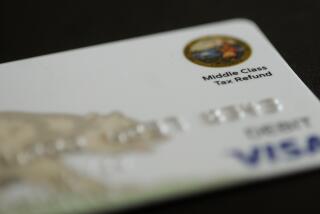Activation fees for gift cards are tough to justify
- Share via
Why does it cost $4 to activate a gift card?
Encino resident Carol Powell, 67, posed that question to me after being told by a Target cashier about the cost for getting a $25 prepaid card up and running. Powell planned to give the card to a low-income family that her department at Providence Tarzana Medical Center had adopted for the holidays.
“I asked why they had an extra charge,” she said. “The cashier said this was just the way it was.”
To be honest, I never gave gift-card activation fees much thought. Just a routine business cost, I figured. I was wrong.
First, a little context. ‘Tis the season, of course, for going ga-ga over gift cards.
Total spending on gift cards this holiday season will approach $32 billion, according to the National Retail Federation. The average person will shell out $173 buying multiple cards, up almost $10 from last year.
Generally speaking, gift cards bearing the logo of a financial network such as Discover or American Express cost an additional $3 to $6 to activate at the time of purchase.
Store gift cards — good only for a particular retailer — tend not have such fees. You pay $25 for the card, and the recipient has $25 worth of store credit to enjoy.
So I was surprised to hear that Target was tacking a fee of $4 onto its cards.
“We don’t charge an activation fee for our own cards,” responded Jenna Reck, a Target spokeswoman. “The $4 activation fee is for the Target Visa gift card.”
The difference, she explained, is that Target’s own card can be used only at Target stores. The Target Visa card can be used anywhere Visa is accepted.
“They look very different,” Reck said. “Only a very small percentage of people are confused.”
Actually, they look very similar. Target’s in-store card features the red-and-white Target logo. The Target Visa gift card features, yes, the red-and-white Target logo. The main difference is that the Visa logo also appears in the bottom right-hand corner.
Reck said that if anyone buys a Target Visa card by mistake, they can bring it back for a full refund — including the activation fee.
“The activation fee is charged by Visa,” she said.
Not so fast, a Visa spokesman told me.
“Visa does not set gift-card fees, nor do we receive any portion of those fees,” said Paul Cohen. The company gets a small fee for processing Visa transactions, he said, but that’s not paid by the cardholder.
It turns out that the initial activation fee is levied by the so-called sponsoring bank — the institution that issues the plastic.
In Target’s case, this would be either Target Bank, which is the retailer’s own financial institution, or a Delaware company called the Bancorp Bank, which specializes in offering prepaid cards on behalf of numerous businesses.
What are these sponsoring banks doing to merit a $4 gift-card activation fee? They’re not loaning any money, as would be the case with a credit card. The gift-card purchaser is putting up all the cash.
And they’re not involved in processing subsequent transactions. The likes of Visa and MasterCard do that.
Yeah, they’re providing a piece of plastic that probably costs a penny or two. And they’re probably storing data somewhere on their computer servers. But that hardly seems like $4 worth of added value.
After I shared Visa’s declaration that it had nothing to do with the activation fee, Target’s Reck acknowledged that the banks were responsible for the charge. But beyond that, she was decidedly reticent about what the banks were bringing to the equation.
“It is an industry standard to apply activation fees to network-branded Visa, Amex and MasterCard gift cards sold at retail stores,” Reck said.
Ah, the old industry-standard explanation: Johnny took a cookie so I took one too. Who could argue with the logic of that?
Powell said she left Target without buying a gift card. A subsequent complaint to the company resulted in a rep apologizing for the mix-up and saying that some temp workers may not know how to steer customers to the right card.
Powell’s lesson from the experience: “They need to do better training.”
My advice: Always read the fine print before buying a gift card and, if you want to dodge those dubious fees, always favor a retailer’s own cards.
David Lazarus’ column runs Tuesdays and Fridays. He also can be seen daily on KTLA-TV Channel 5 and followed on Twitter @Davidlaz. Send your tips or feedback to david.lazarus@latimes.com.
More to Read
Inside the business of entertainment
The Wide Shot brings you news, analysis and insights on everything from streaming wars to production — and what it all means for the future.
You may occasionally receive promotional content from the Los Angeles Times.











